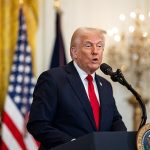President Trump’s address this week at the United Nations General Assembly made it clear that the days of America bowing to globalist institutions are over. Speaking directly to world leaders, Trump criticized the UN’s endless cycle of meaningless resolutions and weak diplomacy, declaring that the United States will chart its own course in defending peace, strengthening sovereignty, and putting its people first. For too long, the UN has represented bureaucracy without accountability, allowing chaos around the globe to deepen while its members congratulated themselves for issuing empty statements. Trump struck a nerve by reminding the world that America will not be shackled to ineffective global forums that prioritize talk over action.
Trump’s speech highlighted what Washington elites and many foreign leaders refuse to acknowledge: real progress often comes when nations act in their own best interests, not when they surrender their sovereignty to unelected bureaucrats. He pointed to his record in helping to establish peace deals in the Middle East—successes achieved outside the UN framework— as proof that decisive leadership trumps endless debates. The President did not mince words in exposing the UN’s track record as one of failure, placing America squarely against the globalist status quo that rewards inaction. His message was simple yet powerful: America will lead by example, but it will no longer let its security or prosperity be undermined by toothless institutions.
https://twitter.com/JakeCan72/status/1970551848814944673
A central target of Trump’s criticism was the UN’s drumbeat for international recognition of a Palestinian state, a cause hailed by European leaders eager to score diplomatic points at home. Trump correctly identified the dangerous folly in rewarding groups like Hamas by granting legitimacy to a future Palestinian government based on radicalism and violence. At a time when Israel faces relentless terror threats, the UN continues to push a solution that would only embolden extremists while weakening America’s strongest ally in the Middle East. Instead of standing with terrorism’s victims, the global elites show a willingness to appease aggressors in the name of “peace”—a peace that has never materialized under their agenda.
The same globalist mindset underlies another existential threat: mass migration. Trump drew a clear connection between the failure of Europe’s immigration policies and the rise of unrest, violence, and cultural collapse across Western nations. France, the UK, and others are now reaping the consequences of decades of open-border policies fed by globalist fantasies. Rather than fixing the crisis or protecting their citizens, these governments opt instead for symbolic political gestures—like backing Palestinian statehood—to placate angry voters. Trump’s warning could not be more urgent: if America follows the same path, it will face the same chaos. His promise to defend America’s borders and sovereignty is not only common sense, it’s essential for survival.
Ultimately, Trump’s speech was not just an attack on the failures of the UN—it was a declaration of renewal for America. The President reminded the world that the U.S. must not be a pawn in globalist experiments that undermine its identity or national security. His vision is unapologetically centered on America’s interests and rooted in the belief that strong, sovereign nations make the world safer than any half-functional international body ever could. As Trump made clear, the age of relying on empty rhetoric from a broken system is at its end. The world may resist this message, but for America, the choice is clear: either reclaim sovereignty and security now, or continue down a path of decline dictated by globalist elites.




